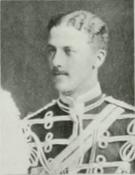
War Memorial
| Captain Harold Vernon BROWNE | |
|
1/1st Dorset Yeomanry (Queen’s Own) Date of birth: 25th August 1885 Date of death: 7th September 1915 Died of wounds aged 30 Buried at Hill 10 Cemetery, Gallipoli, Plot II Row B Grave 12 |

|
| Harold Vernon Browne was born at Buckland Park, South Australia, on the 25th of August 1885 the youngest son of Leonard Gilbert Browne and Helen Mary (nee Strong-Price) Browne later of "Hobourne", Christchurch, Hampshire. He was educated at Hazelwood School, until July 1899 where he was a member of the Cricket XI in 1897, 1898 and 1899 when he was Captain. He was a member of the Football XI in 1896, 1897 and 1898 and was a member of the Choir. The school magazine wrote the following on his 1896 football season: - "When he steadies down and uses his weight, and his head, will be a fine full back." Of his 1897 football season the wrote: - "Full back (left), looks all over a grand back, but at present is lacking in judgement, and he cannot be induced to take the game seriously. He improved considerably as the term went on, and his size and strength ought to make him irresistible." They wrote of his 1898 football season: - "Full back (right), much improved in every way, at times brilliant, but apt to misjudge his distance." They wrote the following on his 1897 cricket season: - "Another great disappointment as a bat; looks all over like a "big" bat, and is - to fast bowling - but lacks patience and judgement with slows. he will, however, be A1 someday. An excellent fast bowler and improving in the field." Of his 1898 cricket season they wrote: - "One of the most inexplicable disappointments in school matches. he shapes as well as anyone, in fact, plays as hard and straight as could be wished, but a straight half volley, in a school match, has been nearly always fatal to him. Has played some splendid innings in the games. A fine fast bowler and usually a safe and brilliant catch." Of his 1899 cricket season they wrote: - "One of the very finest bats we have produced, and would have been even more successful but for his over anxiety in matches which prevents him using his height and strength. Has a magnificent drive and leg hit; a good fast bowler, but with a very tiring action; an excellent field and safe catch." He won the school Golf Championship in 1897. When he left the school, the magazine wrote: - "Takes an unusually fine variety of athletic capabilities to Wellington where, if they will only keep an eye on him, he ought to develop into quite a first rate cricketer. He went on to Wellington College where he was in Mr. Kempthorne's House from September 1899 to July 1902. He was a member of the Cricket XI in 1901 and 1902. When he left Wellington he was taught by a private tutor. On completing his education he played county cricket for Dorset; he was also a fine all round athlete, a first class golfer and lawn tennis player. He hunted regularly with the Blackmore Vale Hounds and rode in many point to point races and steeplechases. On the 24th of June 1908 he was married to Mabel Doris (nee Tillard) at St Peter’s Church, Eaton Square; they lived at Cheriton Manor, Templecombe from 1909 to 1914 and later at Preston Manor, Iwerne Minster, Blandford. They had three sons and a daughter, Anthony Harold Scott born on the 21st of April 1909, Peter Francis William born on the 1st of January 1912, Nigel Phillip born on the 20th of January 1913 and Ursula Patricia born on the 24th November 1915. On the 13th of May 1904 he was commissioned as a 2nd Lieutenant in the 4th (Volunteer) Battalion Hampshire Regiment (Militia) and on the 8th of February 1909 he transferred to the Dorsetshire Yeomanry with the rank of 2nd Lieutenant. He was promoted to Lieutenant on the 4th of October 1913 and to Captain on the 14th of August 1915. On the outbreak of war he volunteered for foreign service and was sent to Egypt from where he went to Gallipoli. He was acting as Military Landing Officer at Suvla Bay throughout the August landings, where he worked in unloading and directing disembarking troops. He was mortally wounded by a shell while on the beach. His Commanding Officer wrote: - “I, like all who came in contact with him, had learnt to be very fond of and admire him. He was a splendid man and a brave soldier, who did not seem to know such a thing as fear or danger, and he met his death, I think and I trust, a painless one, when nobly doing his duty, and actually giving an order in connection with it. He was a true and good soldier and died a soldier’s death.” His Major wrote:- “He has, all through this month…been the life of us all, never out of temper, always cheerful….never minding shellfire in the slightest.” His wife applied for his medals on the 27th of April 1919. He is commemorated on the war memorial at Iwerne Minster in Dorset and there is a plaque to his memory in the church there. He is also commemorated on the memorial at Wellington College. |
|
| Went on to Wellington College |
Back